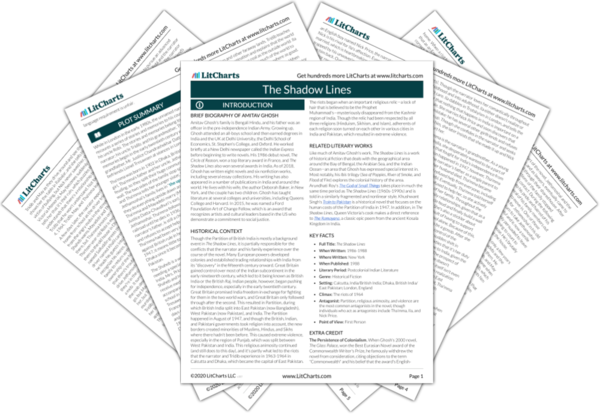The events of The Shadow Lines center primarily around riots that took place in Calcutta, India, and Dhaka, East Pakistan, in late 1963 and early 1964. Though the narrator doesn't discover the truth until the very end of the novel, it's this riot in Dhaka that kills Tridib, a realization that suddenly forces the narrator to reevaluate his experience of the conflict from his hometown in Calcutta and consider the ways in which the riots were an even bigger defining moment in his life than he realized at the time. As the narrator, in his late twenties or thirties, finally pieces together what happened, he begins to consider the role that British colonialism and the border between India and East Pakistan played in the conflict, and how the political unrest of the period truly impacted his understanding of his family and the world.
When the British finally granted their colony of British India independence in 1947, they divided the colony along religious lines, creating the Hindu-majority country of India and the Muslim-majority countries of East Pakistan and West Pakistan. As the narrator, who grew up in the Indian city of Calcutta, describes, these borders meant that he was relatively unaware of anything happening outside his home in India—cities that were a thousand miles away but still in India were in the forefront of his consciousness and understanding, while cities that were a day's drive away, but in another country, simply didn't exist in his mind.
Borders, Violence, and Political Unrest ThemeTracker

Borders, Violence, and Political Unrest Quotes in The Shadow Lines
I would have been frightened, she said. But I would have prayed for strength, and God willing, yes, I would have killed him. It was for our freedom: I would have done anything to be free.

Unlock explanations and citation info for this and every other The Shadow Lines quote.
Plus so much more...
Get LitCharts A+They know they're a nation because they've drawn their borders with blood […] War is their religion. That's what it takes to make a country. Once that happens people forget they were born this or that, Muslim or Hindu, Bengali or Punjabi: they become a family born of the same pool of blood. That is what you have to achieve for India, don't you see?
But I knew I had made a mistake the moment I said it; I should have known that she would have nothing but contempt for a freedom that could be bought for the price of an air ticket. For she too had once wanted to be free; she had dreamt of killing for her freedom.
I began to marvel at the easy arrogance with which she believed that her experience could encompass other moments simply because it had come later; that times and places are the same because they happen to look alike, like airport lounges.
Well of course there are famines and riots and disasters, she said. But those are local things, after all—not like revolutions or anti-fascist wars, nothing that sets a political example to the world, nothing that's really remembered.
But you know, the strange thing was that as we grew older even I almost came to believe in our story.
But he did know that was how he wanted to meet her, May—as a stranger, in a ruin. He wanted them to meet as the completest of strangers—strangers-across-the-seas—all the more strangers because they knew each other already. He wanted them to meet far from their friends and relatives—in a place without a past, without history, free, really free, two people coming together with the utter freedom of strangers.
But if there aren't any trenches or anything, how are people to know? I mean, where's the difference then? And if there's no difference, both sides will be the same […] What was it all for then—Partition and all the killing and everything—if there isn't something in between?
They were all around me, we were together at last, not ghosts at all: the ghostliness was merely the absence of time and distance—for that is all that a ghost is, a presence displaced in time.
Once you start moving you never stop. That's what I told my sons when they took the trains. I said: I don't believe in this India-Shindia. It's all very well, you're going away now, but suppose when you get there they decide to draw another line somewhere? What will you do then? Where will you move to? No one will have you anywhere.
I was a child, and like all the children around me, I grew up believing in the truth of the precepts that were available to me: I believed in the reality of space; I believed that distance separates, that there is a corporeal substance; I believed in the reality of nations and borders; I believed that across the border there existed another reality.
His atlas showed me, for example, that […] Chiang Mai in Thailand was much nearer Calcutta than Delhi is […] Yet I had never heard of those places until I drew my circle, and I cannot remember a time when I was so young that I had not heard of Delhi or Srinagar.
They had drawn their borders, believing in that pattern, in the enchantment of lines, hoping perhaps that once they had etched their borders upon the map, the two bits of land would sail away from each other like the shifting tectonic plates of the prehistoric Gondwanaland.











